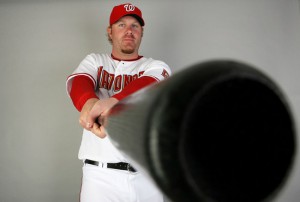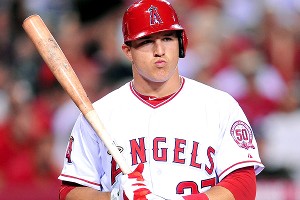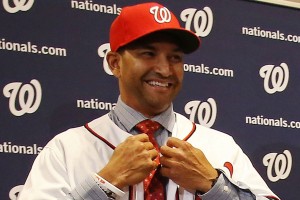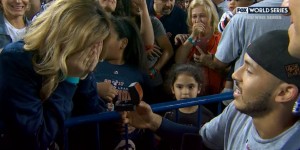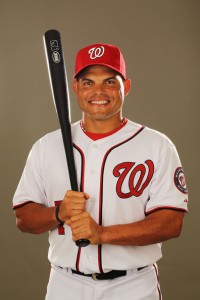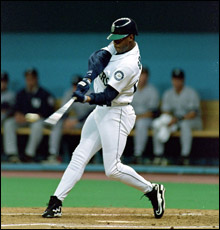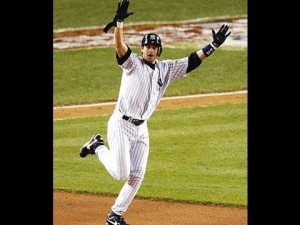This is a semi-recurring piece that we’re bringing back out because your 2020 Hall of Fame class has not one but two former Nats players of some prominence have made it onto the 2020 ballot. We have not done this post in a couple years, so I’ll catch up the last two HoF ballots and then do the 2020 ballot Nats players.
See the 2017, 2016, 2015, 2014 versions.
At the end we speculate about who the first Hall of Famer might be wearing the Curly-W.
2020 Ballot players with Nats ties (2020 ballot). Mark Zuckerman beat me to the punch here, writing an excellent article on both the below players.
- Adam Dunn; two seasons of three true outcomes, the slugger Dunn was a great presence, took a beer-league softball player approach to hitting, and crushed the ball for this team for two seasons while Mike Rizzo rebuilt the farm system. In 2010 he somehow avoided the ignominious feat of 200 strikeouts in a season by just one … a figure he subsequently blew through two seasons later as his career collapsed in Chicago. I doubt he gets any votes and his career implosion upon moving to Chicago remains an oddity; he had 462 career homers but was essentially done as a player at the age of 33. He should have had 5-6 more seasons of hitting 35 homers, putting himself firmly in the conversation of the best power hitters in the sport’s history. Sometimes sluggers just … lose it, and fast.
- Alfonso Soriano played one infamous year in Washington in 2006, was forcibly removed from his preferred position at 2B in spring training, had a 40/40 season, still holds the franchise season record for homers, and used his one season in Washington as a launching pad for a massive contract in a big market going forward. His departure netted us two comp picks under the old system (he was a “type A” FA), which we used to select Josh Smoker and Jordan Zimmermann, one of which helped setup the franchise for
One other interesting name on this ballot? Cliff Lee, who was with the franchise just prior to its move to DC, but was part of the ridiculous Bartolo Colon trade made in 2002.
2019 Ballot players with Nat’s ties: (2019 ballot with voting results and stats from baseball-reference.com).
We forgot to do this post last year, but there was one candidate with Nats ties:
- Rick Ankiel, who spent two full seasons with Washington providing amazing defense in center (to go along with his amazing arm) but paltry hitting at the plate from 2011-2012. In 2012 he was essentially a backup to newly promoted Bryce Harper for the Nats break-out season, but he did not appear for the team in the 2012 post-season ( he was not on their 2012 post-season roster). Ankiel’s comeback story is pretty compelling, but it did not earn him any hall of fame votes and he fell off the ballot after one year.
2018 Ballot players with Nats ties (2018 HoF Ballot):
- Livan Hernandez: wow, what an important player in our history. He was the starter in our first ever game in DC, and also started our first home game. He made the all-star team that year. He came back to the team in 2010, retired in 2014 and for a time was part of the Nats spring training staff. He was named on one ballot and has fallen off going forward.
- Brad Lidge: an infamous member of the Nats-to-Oblivion club, he signed on as a former-closer middle reliever for the 2012 team and got lit up. Not Trevor Rosenthal lit up, but he was not effective. He was released in June and hung em up. He did not receive any votes on the ballot.
Notably, Vladimir Guerrero was elected in this ballot, long time Montreal player. If only he had made it to Washington.
Nats connected names on the 2017 ballot and 2017 eligible:
- Ivan Rodriguez, aka “Pudge,” who surprisingly signed a 2-year deal with the team after the 2009 season and played his last two years with the rebuilding team, splitting time with the up-and-coming Wilson Ramos and retiring after the 2011 season. He was part of the rebound years for the franchise but missed out on their breakout 2012 season. There was some surprise when he got in on the 1st ballot, given his PED rumors, but I take his election as a sign of the changing times with the electorate. There’s definitely a difference between suspicions and a real failed test, and inarguably Pudge is one of the best catchers of all time so there’s no reason to keep him out. Here’s a great link of a video of Pudge finding out he was elected.
- Matt Stairs, whose name I can’t quite say without cursing, who sucked at the teet of the Washington Nationals payroll for half a season in 2011 before being mercifully released on August 1st of that year. His final slash line in his sole season with the team: .154/.257/.169. He went 10-65 with just one XBH for the entire season. Stairs now is now a regular in my semi-annual “Nats to Oblivion” posts, last done in April of 2016. He received zero votes and falls off the ballot.
- Alex Cora: like Stairs, he signed on as a veteran FA to be a role player with the 2011 Nats and retired after the 2011 season. Unlike Stairs, Cora wasn’t judged to even be worthy to make the ballot.
- (As we all know, Tim Raines, Vladimir Guerrero, Orlando Cabrera and Larry Walker all grew up with the Montreal franchise, but never appeared for the team post-move to Washington, so I havn’t included them here. Cabrera was the closest to appearing in a Nats uniform, getting traded to Boston mid 2004 season just prior to the move).
Useful Hall of Fame links links:
- 2017 Ballot on baseball-reference.com, with links to vote counts, stats, etc.
- Full Voting figures via BBWAA.com
The rest of this post will let you answer the trivia question, “Prior to Ivan Rodrigiez’s enshrinement, what former Nats player has come the closest to Hall of Fame enshrinement?” (Answer at the bottom).
We’ll work from most recent to oldest.
Not a single Nats-connected was on the official Class of 2016 ballot. As it turned out, There’s actually quite a few guys who were *candidates* for the 2016 ballot by requirements, but who didn’t make the cut who also had connections to the Nationals. In fact, there’s quite a few of them. Here’s a good list, thanks to the excellent research by Bill from platoonadvantage.com.
- Ronnie Belliard: Played pretty well for the god-awful stretch of Nationals teams from 2007-2009, posting a nifty 123 OPS+ during the middle season before getting traded away at the 2009 trade deadline for two minor leaguers who never went anywhere (Luis Garcia, Victor Garate). Stuck with Los Angeles one more season before hanging them up at 35. Played parts of 13 seasons in the majors but didn’t rate a spot on the ballot.
- Jesus Colome was an important part of the Nats bullpen during the same 2007-2009 span that Belliard was involved with, getting more than 120 appearances his first two seasons before posting an 8 ERA in 2009 and getting DFA’d in July. He got picked up the next year by Seattle and got a few appearances (hence why he’s not on the “Nats to Oblivion” lists) and, if you can believe it, is still pitching at age 37 in the independent Atlantic league as we speak. He did manage 10 distinct years w/ MLB appearances though, so he qualified.
- Jose Guillen came to Washington with the Expos, played one solid year in 2005, had a season-ending elbow injury in 2006, then bounced around the league for a few more years. He was active for 14 total seasons but never made an all star game. He hit 24 homers for the surprising 2005 Nats … and led the league in HBPs.
- Cristian Guzman signed a somewhat controversial 4yr/$16M contract (it cost the team its 2nd round pick) that started when the team moved to Washington, was god-awful his first year, then had to have shoulder surgery to miss the entirety of 2006. He recovered his stroke in 2007 and actually made the all-star team in 2008 (our only representative during the dark years) … which was enough to convince our idiot GM Jim Bowden to give him a 2yr/$16M extension to an aging shortstop w/ no power on the wrong side of 30. Not surprisingly, his OPS dropped 100 points in 2009 and the team dumped him on Texas in a trade-deadline deal after he had lost his starting job to Ian Desmond, netting the Nats two RHPs (one of which Tanner Roark makes this one of the better trades ever consummated by the Nats executive staff). Guzman played in 15 more games for Texas, batted .152 and never played again.
- Aaron Boone, who signed a 1yr/$1M FA contract to be a backup corner infielder with the abhorrent 2008 Nationals team. Boone’s crowning baseball achievement was his extra innings walk-off homer that ended one of the best games in MLB history (Game 7 of the 2003 ALCS between Boston and the Yankees, ranked #6 by MLB’s panel a few years back when ranking the best 20 games of the last half century). Ironically one of his lowest moments was just a couple months later, blowing out his ACL that subsequent winter while playing pickup basketball, costing him the entirety of the 2004 season and the trust of the Yankees organization. He missed 2/3rds of the 2007 season after another left knee injury and the Nats were probably his last gasp shot at extending his career at the age of 35. He got a decent amount of playing time thanks to the fragility of Ryan Zimmerman and Nick Johnson, somehow got another guaranteed MLB deal the following year, went 0-14 for Houston and was released. He’s now an analyst with ESPN. Received 2 votes on the 2015 ballot.
- Ron Villone signed a minor league deal in 2009 and was quickly added to the Nats active roster, where he appeared in 63 games as our primary one-out lefty. He pitched the entirety of 2010 on another minor league contract with Syracuse, posting a 6.59 ERA as a 40-year old and never earning a call-up. In 2011 he was invited to spring training again (perhaps with the hope that he’d join the organization as a coach) but he got cut, then pitched a handful of indy league games for his home-town New Jersey indy league team, got hammered, and hung them up. He retired having played in 15 seasons for no less than 12 different teams. In 2012 he took a pitching coach job with the Cubs organization (one of the teams he managed NOT to play for during his career) and has been moving up their organization in that capacity since. Received Zero Hall-of-Fame votes by virtue of not appearing on the BBWAA ballot.
- Julian Tavarez signed a one-year deal in the beginning of 2009, started out decently but had an awful stretch that resulted in his DFA in mid July 2009. He never threw another pitch in organized ball, abruptly retiring considering his mid-season release. He ended a 17-year career spanning 11 different franchises. Received Zero Hall-of-Fame votes by virtue of not appearing on the BBWAA ballot. According to his wiki page, he now resides in a suburb of Cleveland (his original professional team) but does not list any post-career activities, baseball-related or otherwise. Received Zero Hall-of-Fame votes by virtue of not appearing on the BBWAA ballot.
Both Tavarez and Villone belong to the infamous “From Nationals to Oblivion” club, a topic we revisit on an annual basis.
Note: it is not entirely clear to me why Villone and Tavarez were not actually ON the 2015 ballot; both seem to have the qualifications (10 years of experience and 5 years retired) and both were on previous versions of the “anticipated ballot” at baseball-reference.com, but neither showed up on BBWAA’s official ballot for this year. Pete Kerzel did a post reviewing “Nats connected” 2015 ballot members when the ballot came out in Nov 2014 and only mentioned Boone. I include them here since it seems to me they *should* be on the ballot and I’m not sure why they were not (unless someone is passing judgement on the “quality” of HoFame ballot members). Are they pushed to subsequent ballots for some reason? If anyone has insight i’d love to know.
- Paul Lo Duca: one of Bowden’s more infamous signings; he went from our opening day catcher in the 2008 season to being released by August 1st. The highlight of his tenure here was having his name being revealed in the Mitchell Report just a couple days after signing with us. After his release, he signed on to finish out the season with Florida, took a year off and attempted a come back in 2010 (signing a ML contract with Colorado but never appearing above AAA). Hard to believe this guy was a 4-time all-star. Received Zero hall-of-fame votes.
- Royce Clayton; signed a contract to be the Nats shortstop during the lean Jim Bowden years, and then was included in the Mega swap of players that headed to Cincinnati in the 2006 season. He hung around for one more season in 2007 as a backup short stop and retired afterwards. Received Zero hall-of-fame votes.
- Mike Stanton was picked up in mid 2005 after being released by the Yankees, and he pitched well enough for the Nats that he was able to fetch a couple of low-level prospects in a late September move to Boston (who was looking for some late season bullpen cover). The team then re-signed Stanton for 2006, and flipped him again mid-season, this time to the Giants for Shairon Martis. Stanton toiled a one more season before hanging them up after 2007. Received Zero hall-of-fame votes.
- Vinny Castilla: signed a two year deal to join the Nats, timed with their inaugural season in Washington, but was traded to Colorado for SP Brian Lawrence when it became apparent that Ryan Zimmerman was set to man the hot corner in DC for the next decade or so. Played one more season and retired after 2006. Received Six (6) Hall-of-fame votes.
- Carlos Baerga: signed a one year deal as a 36-yr old to join the Nats in their inaugural season and serve as a backup infielder. Hit .253 in part-time duty and hung ’em up after a 14-year career that can be well described as “journey-man.” He was an integral part of the early 90s Cleveland Indians as their starting 2nd baseman and a 3-time all-star, and ended up playing on 6 major league teams and spent parts one season in Korea. Received Zero hall-of-fame votes.
So, outside of Pudge’s election, the Nats greatest Hall of Fame achievement is Vinny Castilla receiving 6 sympathy votes.
We still have to wait a while to see another player with a “W” on their hat in Cooperstown.
So, who might that actually be? In the years since we started this sad post, the team has acquired and played more than a few elite, regular all-star type players who may very well be in Cooperstown at some point.
- Bryce Harper? Not likely; if he makes it, he’ll likely wear a Philly cap based on the 13-yr contract he’s signed there.
- Anthony Rendon? despite his great 2019 season, he suffers from similar issues as guys like Scott Rolen; top-notch defensive 3B are a tough sell to Cooperstown. He’s now signed with LAA for the next 8 years or so; if he makes it to Cooperstown, he’ll have earned it likely based on his next few seasons of work moreso than what he’s done with Washington … which means no curly-W for him.
- Max Scherzer: most likely; he’s basically guaranteed his Cooperstown entry with his 3rd Cy Young award, two of which have come with Washington. I think that pushes him over the edge to wearing our hat.
- Stephen Strasburg: right now he seems like he’s in the Kevin Brown category of good but not great pitchers when it comes to Cooperstown consideration; he needs a Cy Young on his resume before someone really considers him.
